#magi analysis
Explore tagged Tumblr posts
Text
How Alibaba's Courage is the key to regain his self-worth - A Magi Character Analysis (Part 1)

Alibaba Saluja is one of the protagonists of Magi. He's an incredibly human and inspiring character which constantly changes and develops throughout the story, with each arc adding layers to his portrayal that let us know just how deep his self-loathing runs, teaching us how to combat it through courage and wit.
I'll be analyzing his character chronologically through each arc (In this post, Qishan, Balbadd, Sindria and Reim, because I got past the image limit), in order to find out why he is the way he is and how he stumbles along the journey to find worth in himself and his existence.
A Cowardly Protagonist
Alibaba Saluja... is a coward. He's afraid to act, thinking he'll mess things up, knowing that he just doesn't have the skills to change anything in a meaningful way. His past determination to gain enough power and money to be able to do something in regards to the inequality and injustices in Balbadd is but a distant dream—he's accepted he's just an average individual, who will never truly make a change.

He's... settled, as nothing more than an assistant to a wine trader, and it's all due to his low self-worth. And things will stay that way for years... until he meets Aladdin.
Aladdin is able to see the good in Alibaba, beyond the facade of a pathetic young man. Because he realizes that, when it matters most, when he has to choose between money and his stability and the lives of complete strangers, he chooses the latter.
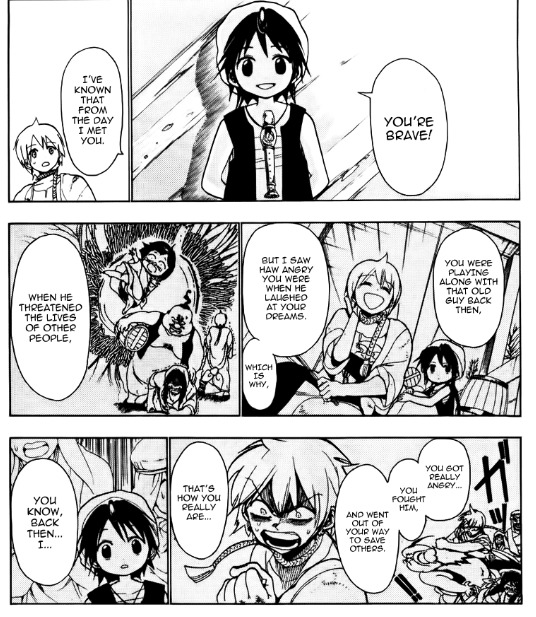
His compassion and bravery wins against his poor view of himself—he had been lying to himself for so long, that he had started to believe that lie. But all it took was someone to see past that, to believe in him and reassure his worth, for a truly splendid king vessel to be born.
Thus, with newfound confidence, Aladdin and Alibaba enter the dungeon.
Here we see the first snippets of Alibaba's mysterious past, with Ohtaka cleverly showcasing his wit, his ability to read foreign languages, and his masterful skill with the sword.

These skills which not only increases the viewer's curiosity in Alibaba, but also prove that he's much more capable than he himself thinks—a reocurring theme in his character.
Thus, his time in the dungeon proves to Alibaba that he does in fact have the qualities he needs to shine. Strength, courage, kindness—these are all Alibaba's strongest points, that his low self-esteem didn't allow him to see and that Aladdin helps him recognize as well.
I also love how Alibaba constantly postures as completely hedonistic, saying his motivation are girls and money, and the first thing he does when he becomes rich is use the money he got to free the slaves that Jamil possessed and give them a salary, including Morgiana, who gave him the beating of a lifetime—it's so in character for him, and it just shows us once again where his priorities truly lie.
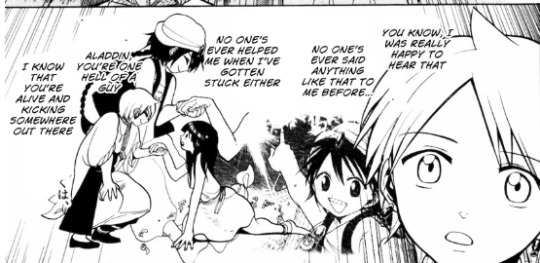
This first arc sets up Alibaba's character incredibly well, showing us how the only thing he needed was the push from someone who believed in him—and I'd say that's the beauty of the dynamic of the Magi and their respective King Vessels. It's a bond founded on the idea that, to achieve your true potential, you need others to see it in you, in order to regain your confidence and truly shine. Being alone is not a strength compared to fighting side by side with your friends, and no sole person can make the right choices for the world—this is an important theme in Magi that Alibaba and Aladdin's bond showcase perfectly.
Alibaba's Past

Before talking about Balbadd, it's important to talk about Alibaba's past. The impact that his life on the slums and then as a prince had on shaping his identity is excellently written, whether it is to explain his low self-worth, his kindness and good heart, or his wit and skills.
I think that one of the key ways in which living on the slums influenced Alibaba is how grounded he can be, despite his idealism. He knows how horrible and unfair the world can be, which is the reason why he was so quick to assume that he had no way of changing things in Qishan. That's how the world "worked", in his eyes, and his entire lifestory had drilled into him the idea that he didn't have the strength to change that.
However, thanks to his mother's kindness and love, he gained a degree of hope and naivete that no amount of tragedy would uproot—unlike his friend Kassim. These two characters shows us how even two people growing up in the same environment can turn out to be wildly different according to their nature—but, most importantly, due to the people who raised them and the things they've had to do because of them.

Alibaba and Cassim both had horrible self worth that they coped with in different ways, and I could (and will) dedicate a whole post to that dynamic, because I love Kassim as a character. As a takeaway, though, Alibaba abandoning Kassim is something that he will always regret coming forward, and it's a vital point on his decision for joining the Fog Troupe.
The most important part of Alibaba's past, though -the incident that shaped who he would become as an adult- is the attack on the palace organized by Kassim and the people from the slums. The death of his father, and the loss of the royal treasure, were all caused by his naivete and willingness to trust in Kassim—Alibaba's most valuable traits were the ones that costed him everything.

No wonder Alibaba would repress his kind nature and become a lot more opportunistic and cynical after the fact—in his mind, he was cemented as a coward because of his heart... and yet, deep down, the promise he made to his father to protect the people of Balbadd, as part of the royal family, would be the tiny flicker of hope that would guide him, taking it as his duty and responsibility until very late in the manga.
However, Balbadd tests these beliefs, and showcases how he is still lacking valuable lessons before he's able to truly make a change in the way he wants.
Balbadd is Failure
As he joins the Fog Troupe, Alibaba is put into a position of leadership... and he sucks at it. He knows that the situation in Balbadd has to change, but he doesn't know HOW to change it. Once again, he falls into following another's plan, serving as Kassim's puppet with royal blood in order to gain influence and power. He is, supposedly, the leader of the band, but only in name, doing acts of "justice" against the rich without a clear purpose or objective. And not to mention that when Aladdin meets him, he rejects him, seeing it as something he has to do... alone. Because his responsibilities are his and his only. Alibaba is trying to change things, but his methods are idiotic, because he's not truly acting for the sake of Balbadd, rather, he's trying to compensate for his past mistakes—for his poor view of himself.

When Alibaba fails, his first instinct is to isolate himself—to wallow in self-pity and be unable to act. And that is natural, it's human. But Alibaba can't take it—because everytime he has failed, everyone else has had to pay because of it. Even as a child, he probably felt as if his mother's death was his fault, and then his father died because of him,—Mariam too, and Kassim seemed to be next in line if he didn't take action. Taking the burden of a whole country full of systemic issues in his shoulders on his own is a recipe for failure, and yet Alibaba can't help but try and help as he can, because he's a good person.
However, as I've said before, doing things on your own, taking immense burdens by yourself—these aren't just bad choices for you, but also for the world around you. "Doing it together", whether it is on a personal level, or, later on the story, a political one, is Magi's motto, and it's the reason why Aladdin is the perfect person to guide Alibaba.

However, the one who will show him how to truly make a change is Sinbad. Once he takes leadership of the Fog Troupe, he's all that Alibaba isn't. Strong, charismatic, more experienced, great at inspiring others, good with the ladies—someone who cooperates with his allies instead of doing things by himself and has a clear objective in mind, a tangible goal that can change the reality in Balbadd. He rightfully criticizes the Fog Troupe's destruction, obviously founding in a desire to lash out rather than a real wish for change, which serves as inspiration for Alibaba moving forward.

The ways in which Alibaba and Sinbad are foils to each other are material for its own post, but for now, all that we have to know is that Sinbad, in Alibaba's eyes, is living proof that he's just... not good enough. He constantly compares himself to others far more experienced than him—and he always ends up frustrated because of it.

After this, he almost falls back into settling and doing nothing again. But once Kassim threatens with attacking the palace and cause a civil war, and Alibaba knows that he can't tell Sinbad or he may harm his best friend... Alibaba steps up, once again.

He storms the palace by himself, showing the fruits of his training and determination, and, now inspired by Sinbad, has a clear idea of what he wants to do with Balbadd.


Using all that he learnt during his time away, he proposes to create a Democratic Republic, and everything... actually works out.
This is the first showcase of Alibaba's negotiating abilities that will be a fundamental part of his character later on—he uses his knowledge of thw world to propose a different way of resolving things that not even Sinbad, who worships power for himself, had thought of, and even uses a sophism to gain Kougyoku's favor and stop Kou from invading Balbadd. It's genius, and it showcases in several steps just how smart and resourceful Alibaba is. Thus, once Sinbad reaches the palace... everything's been resolved.
Alibaba proved that in desperate times, he can live up to the expectations, and that Aladdin and Morgiana aren't wrong for believing in him. Sinbad finally understands what's so special about this guy... His bravery, his honesty, his compassion, and his mind. And when he's not strong enough... his friends are there to help him:




This moment really struck a chord with me—it may even be my favorite in the manga, with a magnific double spread in which Aladdin admires to himself the hidden strength which Alibaba possesses but he can't even see. It's because he's Alibaba that he could do as much as he did. And he should feel proud of himself because of that.
And with that same good heart, he reaches out to Kassim and allows him to return to the Ruhk instead of being lost forever into depravity. He uses his shameful past and miserable days as a way to connect with his friend,

And he thinks again and again for the sake of others, lamenting inequality, and truly empathizes with the plea of someone who was crying for help without even realizing it. He opens up his heart, and Kassim is saved as a result.
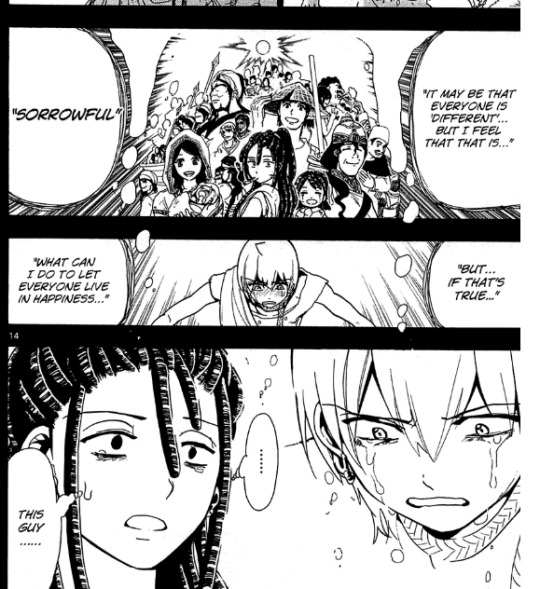
Empathy is Alibaba's greatest weapon, and it will always be moving forward.

Alibaba's Heart
However, after that, shits hits the fan, Balbadd is attacked by the Kou Empire and Alibaba is forced to flee... knowing that he failed completely in saving his friend's life AND his country... and it was all due to his lack of power.

No matter how cool you are or how much you believe in yourself, the world won't accommodate to your determination. You NEED to be able to show results, not only with words, but with your actions as well. And the current Alibaba... just isn't strong enough to save his people. Now everything is up to the powerful Sinbad, which frustrates the young prince to no end.
What I love about the arc his character has to go through during this part of the story, is how it showcases how Alibaba has grown so much... but also how he's still defined by his flaws.
Unlike Hakuryuu, he's able to do well in the dungeon because he learnt that he can't do everything by himself and that friends are there to support each other in the toughest of times, without caring about how personal the matter is. After learning his lesson, he serves as a role model for Hakuryuu to follow, which is wonderful.


I especially love the choice to have Alibaba cry so desperately (due to being reminded of Kassim) here. He's vulnerable and he's rewarded for it—it's the trait that all powerful king vessels like Sinbad or Kouen don't have which allows him to connect with Hakuryuu.
His encounter with Kougyoku showcases this trait once more—even the crazy princess of the empire to blame for the state of his country is just another girl to befriend in his eyes.
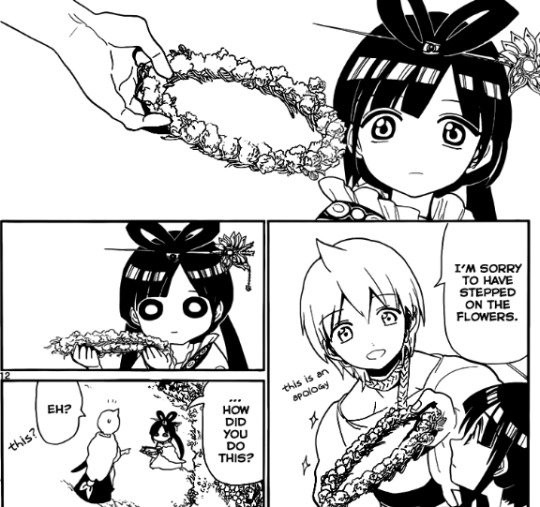
However, as I said, this arc also showcases Alibaba's weaknesses, directly tied to his sensibility. Despite Sinbad’s reassurance that things could have gone much worse in Balbadd if Alibaba didn't intervene, he still falls falls back into a pit of not doing anything, without a clear objective. He's frustrated for not being able to save his people, as if he were responsible for Balbadd just because he's of royal blood—despite that fact going against his own idea of trying to install a democratic republic to end the royal family, who don't have any more right than the people in choosing how they live.
Because of his frustration and tendency to rely on Aladdin for validation and Sinbad to resolve everything for him, he ends up going along with everyone's wishes, and if Aladdin hadn't prevented him from accompaying him to Magnosttadt, he would have gone there instead of doing the things he HAS to do in order to fulfill his goals.

The last step Alibaba has to go through to regain his confidence is to do it by himself, knowing he's enough. This might seem paradoxical consider that I said before that Magi is all about bonds, but I think that even though they are important, they should serve as supports for your own strength rather than pillars, that, if broken, leave you with nothing to stand on.
Bonds are important, but solely relying on them... (or on just one, shining person...) is also a mistake.
Whatever the case, it's this constant struggle between being confident and being insecure... these contradictions, that prove that no matter how incredible Alibaba can be at times, he's still human. And it's so REALISTIC. He's incredibly consistent regarding what he's good and bad at, which in my opinion, is marvelous writing, and watching him overcome these flaws is beautiful to see unfold.
Either way, the tale of Alibaba continues as he slowly realizes that he HAS to follow his own path, without copying anyone else's, going into Reim to become stronger and be able to full body Djinn equip.

Aside from cleverly presenting to us Reim for the first time, this mini arc delivers by once again showcasing Alibaba's strength and use of his past experiences to beat the obstacles that appear before him in the present. It's an arc that shows us not just how far he’s come, but also, how much he still has to grow, as the two magois inside Alibaba represent both his and Kassim's united hope.
Thus, Reim is for Alibaba a journey to remember his purpose, and regain confidence in himself to a point that he can now act according to what he wants, standing his ground and not letting anyone or anything dictate the course of his life.

Whatever the case, the next time we see him, we stand in front of a wiser Alibaba. Someone who can pass on the same lessons he learnt to the friends that have helped him so much—someone who can oppose strong opponents with confidence and wit... and yet someone who still isn't perfect, and who still has to grow a lot before being an equal against the likes of Kouen or Sinbad.
Part 2 Here:
#alibaba saluja#alibaba#magi#magi: the labyrinth of magic#magi the labyrinth of magic#magi meta#magi analysis#alibaba analysis#alibaba magi#alibaba meta#part 1 because I ran out of images lol#part 2 is already written so#magikathmeta
53 notes
·
View notes
Text
I know “Homura is Catholic” is only vaguely implied (in canon, all she says is that she went to a Christian missionary school, and in Japan those are overwhelmingly run by the Catholic Church) and we meme about it, but like. As someone who was raised Catholic, I have never seen a more Catholic character than Homura Akemi.
The religious-level obsession she has with Madoka. Her all-consuming guilt and self-doubt. Viewing suffering for Madoka’s sake as something beautiful and aspirational. Viewing herself as the literal devil for having selfish desires that aren’t even that bad.
Anyway who do you think her confirmation Saint would be
#idk why but my brain immediately went to Saint Sebastian#pmmm#puella magi madoka magica#madoka magica#homura akemi#Catholic#Catholicism#my analysis#analysis#1k#2k
3K notes
·
View notes
Text
It's actually really important to me that one of Sayaka's breaking points was her overhearing men being sexist and gross before absolutely losing it. Because it further emphasizes that Sayaka's main tragedy is not a boy not falling in love with her.
I think you can start applying this to Sayaka's character from when Mami first warns her to be cautious. What Mami tells her about think of why she's making her wish, I think it still applies, but not as her wanting Kyosuke to love her. I think Sayaka wanted to do good for others, but at the end of the day she wanted something out of that, primarily justice, change, a chance to make things better.
Her main tragedy is trying her absolute best to care for people, to be righteous, to use the powers given to her, to carve a better world; but to be given nothing in return. No reward, no foreseeable better future. Just suffering. And her eyes open to the suffering of others just for her to not be able to do anything about. Again and again and again.
And she tries to do this selflessly, like Mami indirectly told her to. To be fine with her efforts not being recognized, to be fine with people finding happiness without her, to be fine with people not respecting her right to make her own decisions. But at the end of the day that doesn't work and it tears her apart.
She wants to do something for the world, and risks her life to do it, the only thing she gets in return is her bodily autonomy being taken away. She's turned into a husk of a soldier without fully knowing what's going on. She's not even the best soldier (like her best friend could be), an average one. And she still tries to use that to keep fighting, because it has to be for a reason. It has to mean something. Because she's essentially given up everything, it has to mean something. It has to help her reach her goals in some way. Right?
It's not just a messed up way to cage her in a system that forces her to add onto the injustice she's fighting against. Right? Right?
(Maybe she calls herself stupid because she thinks she's stupid for trying to change things, for believing that things are capable of change)
#sayaka miki#puella magi madoka magica#Pmmm#pmmm sayaka#Madoka magica#Miki sayaka#Sayaka#Thinking of Sayaka (my beloved) because I'm drawing her#pmmm analysis#Pmmm meta#Rambles
1K notes
·
View notes
Text
it feels like at least here I barely see any analysis on madoka herself. It’s usually almost always an analysis on another character that brings up madoka (most of the time homura) or it is the 500th analysis about how madoka actually didn’t want to be a god, missed her family, and had severe self doubt issues. Which is all well in good but I just wish there was bit more for her.
I just wish more analysis would tap into madoka herself. In how despite the amount of suffering madoka has seen and had to endure herself she still sees the world as something worth protecting. How much empathy she has for others; in how she never snapped back at Sayaka and continued to stay by her side no matter how much she lashed out at her and how she decided to make a contract just so Mami wouldn’t be lonely anymore. How she made a wish with Kyubey that would separate her from her family and friends forever just to validate and protect the hopes and wishes of magical girls while allowing them to burden madoka with their pain. How fucking powerful she had to be as a god to nearly break Homura’s world by simply just starting to remember who she truly was.
I just…I fucking love madoka and it frustrates me deeply how little appreciation some parts of the pmmm fandom seem to give her asides from the fact that she became a god.
#talk away ⌞🍵🍋 ⌝#madoka kaname#kaname madoka#hey could you tell that madoka is my favorite of the holy quintet lol#extremely boring but I love her#madoka magica#puella magi madoka magica#madoka magica spoilers#pmmm#pmmm spoilers#madoka magica rebellion#madoka magica rebellion spoilers#sorry if this sounds whiny#madoka analysis#there’s also the moment in which madoka is currently ascending when she talks with Sayaka#and she clearly holds no judgment towards Sayaka’s treatment of her before she became a witch#she knows that Sayaka was just in pain and does not hold the things she said to her against her#and how she tells Mami that if someone were tell her how it’s a mistake to believe in hope she’d tell them they’re wrong and…#keep telling them their wrong
771 notes
·
View notes
Text
okay so i was thinking recently about how some people are like “oh why didn’t homura just wish to revive madoka” when talking about madoka magica and honestly? i think thats a misunderstanding of her character.
one of the most defining traits we get of homura in episode 10 starts is how insecure she is in herself. she downright hates herself and has nobody to rely on - she has no friends from her prior school and her family is completely absent in the series. then, she meets madoka who is somebody who values her as a person.

as the month continues, madoka and homura grow closer and homura accompanies madoka and mami to witches but can’t do anything as she is not a magical girl. she continues to feel useless and admires madoka for being somebody who is strong, kind and emphatic.
the guilt about her uselessness comes to fruition with the battle against walpurgis, in which madoka is killed. what we see is a girl who is 14, grieving for somebody who she loved and admired. at this moment, homura genuinely believed if she was useful, she would’ve been able to save madoka.


the tragedy is that it doesn’t work out like that. when homura travels back and meets madoka again, she expects madoka to remember everything too, which does not happen. and when they survive walpurgis, madoka becomes a witch. homura only continues to feel useless.

next timeline, she still remains idealistic. she genuinely believes if she tells the truth about witches, it will work out fine. it does not. and then, after madoka’s last actions and words, is when she completely breaks and becomes the cold girl we see in the series.

homura is ultimately an idealist. she genuinely believes that if she is more useful, if she tries harder, everything bad will be prevented. the tragedy of the story comes from the fact that the universe prevents this. yes, homura could have wished to revive madoka. but, emotions and grief are a dangerous force that here leads to a tragic end.
#not art#character analysis#wooo#homura akemi#puella magi madoka magica#madoka magica#madoka magica spoilers
302 notes
·
View notes
Text
kinda long homura rant/analysis
“homura doesn’t care about anybody but madoka !!!!”
literally homura:
originally tried to save all of the girls before she eventually gave up bc it was literally impossible,
literally ran like hell to get sayaka’s soul gem back after madoka chucked it off the bridge and even closely inspected it w such care to make sure it wasn’t damaged at all,
admitted that she has hurt people (most likely the magica quartet, aka all of her friends, bc who else?) and feels immense guilt abt it and wishes she could erase it all (she literally says that hurting mami hurt HER),
can’t bare to kill mami (she looks so conflicted and sad when pointing the gun at her) and can’t even look at her when she shoots her in the leg bc she rly doesn’t want to hurt her,
subconsciously created a desired reality that she brought all of her friends (even kyosuke and hitomi, implying that she even cares for them as well) into where alive, happy, and together (ppl seem to forget that homura’s labyrinth was literally what she’s wanted deep down before it started to fall apart as she realized it was fake; sayaka literally points out how a witch who just wants to keep everyone happy and out of harm can’t be that bad, and kyuubey points out how homura would have most likely preferred to stay in this fake, happy world instead of realizing the horrible truth),
apologizes to kyoko for “getting her involved in this” after she realizes that she herself is the witch, aka most likely apologizing for wasting kyoko’s time when she asked her to go to kazamino city w her and for calling her,
rewrote reality in order to bring sayaka and bebe back to life and give everyone the happy life they always desired and deserved (she is literally willing to proclaim herself as “evil” and “the devil” and be unhappy if it means that madoka and everyone else gets to be happy and alive, safe from all the pain and the incubators who are still trying to prey on them and all magical girls)
… but she only cares abt madoka?
#💀💀💀#like c’mon guys…#it’s right in front of ur face…#we can’t be THAT media illiterate 😭#akemi homura#homura akemi#madoka magica#madoka magica homura#mahou shoujo madoka magica#pmmm homura#puella magi madoka magica#akemi homura rebellion#akuma homura#devil homura#homura akemi my beloved#mahou shoujo madoka magica rebellion#puella magi madoka magica rebellion#madoka magica rebellion#media literacy#common sense#media literacy is dying#media literacy is dead#character analysis#analysis#meta analysis#show analysis#media analysis#fandom critical#fandom critique#fandom criticism
551 notes
·
View notes
Text
the fact that the moment kyoko realized sayaka was unsaveable was when Oktavia hurt madoka is so much sadder when you remember kyoko's dad was violent to her mom when he was going insane
#it does explain why she looked so horrified tho#theres probably a better way to word this idk..#kyoko sakura#pmmm#madoka magica#puella magi madoka magica#analysis#character analysis#i think#meta#what does meta mean anyway i assume its synonymous to media analysis but idk#sayaka miki#oktavia von seckendorff#madoka kaname
364 notes
·
View notes
Text
Homura and Sayaka make me insane because like... Both of them have this black and white "things are either pure or disgusting" way of thinking.
Sayaka still tries to be pure. She tried to hunt witches without taking anything in return. Her uniform has a knight motif and colors that are often associated with purity and cleaness, she broke down the hardest at the idea of being a "zombie", she destroyed herself while trying to be a hero, and in the law of cycles she's basically an angel: a godess's best friend, assistant, messenger.
Homura, on the other hand, has long ago accepted that she's disgusting. She doesn't react to death and blood unless it's Madoka anymore, she quite literally says she doesn't call herself human, she's often associated with a lizard, an animal that is dirty and coldblooded. She calls herself the devil, and don't get me started with all of the Clara dolls except love representing a negative trait or feeling.
I feel like there's so much you can do with these two, it can go to multiple directions. Maybe the brave, good knight will reach out to this poor girl who's just sad and confused, and make her see that she can still be good. Maybe the devil sees right through the knight's bullshit and drags her down instead, and it's painful at the beginning, but then it helps the knight sees that trying to be heroic all the time won’t get her anywhere. Maybe both rub off on each other somehow. Regardless, I feel like they'd benefit from sitting down and actually talking to each other, because the care is still there, even if it's buried under layers of anger. Lock them in a room with no weapons and give them some time/hj.
#puella magi madoka magica#madoka magica#pmmm#sayaka miki#homura akemi#homusaya#i like the ship but you can take this as just analysis#pmmm analysis
272 notes
·
View notes
Text
madohomu being one sided is so perfect to me. the tragedy of homura going so far for madoka while madoka does love her, but in that divine way that madoka loves everyone. even more tragic is that it's that very trait that caused homura to fall in love with madoka in the first place; she accepts that madoka won't reciprocate her love and even still will walk to the ends of the earth so that madoka may find happiness. in her own way, homura is searching to return that selfless kindness that madoka showed her.
while i do love that, there is a unique tragedy still if madoka does share homura's feelings. because even if they both love each other, madoka will still leave homura behind for the greater good of everyone. madoka is capable of fighting 'selfish' desires that homura cannot. they both know this; that their love is eternal but their connection is not.
regardless, both sides harbor uncontrollable love at all times. that boundless love is what defines them both.
363 notes
·
View notes
Text
There is a tendency I see in PMMM analyses and discussions to treat the witches simply as monsters that can be overcome with sufficient force regardless of other circumstances--and thus Homura's failure to ever win against Walpurgisnacht on her own terms is something that could be easily fixed with more firepower and different tactics. And while there's nothing wrong with this interpretation, it's not one that particularly interests me, either.
What I like about PMMM and what makes it so engaging for me, is that it can be read on multiple levels--both as a literal journey and as a symbolic one. In-universe, witches are the shadow selves of magical girls; is it really so surprising that they also serve as narrative foils to those who face them, thus making victory or defeat as much of a character issue as a tactical one?
It is not a coincidence that Mami Tomoe, a girl who was forced to grow up too fast and who could have wished to save her dying parents but didn't, meets her end at the hand of a particularly childish and immature witch, a lumpen, misshapen doll that transforms into a clown--a girl who never grew up, who could have wished to save her dying parent but didn't. Mami, an experienced veteran who wiped the floor with the Rose Witch and her familiars earlier, is completely caught off-guard and is eaten alive by a witch who embodies all of the issues she herself struggles with and has yet to overcome within herself.
Yes, Mami was careless and overconfident, which led to her doom--but she had also fulfilled her role of introducing Madoka to the world of magical girls. On a narrative level, her death was necessary--not only to free Madoka from her impulsive promise to become a magical girl too early in the story, before she'd learned all the facts and could make a fully informed decision, but also to teach Madoka one final, horrific lesson about what life as a magical girl is really like.
This is not to say that AUs where Mami survives are wrong or missing the point--I've written them myself and I love them! (It helps that Mami's survival is usually the result of someone else's interference, not something she accomplishes on her own.) Nor do I mean to suggest that Mami's death is a moral failing on her part--merely that I think that Charlotte represents Mami's own particular brand of kryptonite at that particular point in her life, one she might have been able to survive if she had been able to move beyond the psychological issues hobbling her.
Meanwhile, Homura is able to easily defeat Charlotte, because metaphorically she's moved beyond the childish worldview that Mami is still stuck in. From that same symbolic perspective, it's this relative level of maturity, as much as her time stop and pipe bombs, that allows her to win.
Likewise, it is not an accident that the next witch Madoka encounters is one that specializes in extracting the memories of its victims, trapping Madoka in a spinning carousel as she is tormented by her own grief and guilty conscience over Mami's death. She is freed by Sayaka, who has moved beyond such angst by her decision to take on Mami's role as an idealized magical girl protector. Later on, Sayaka's descent into dualistic thinking is symbolized by her fight against a witch whose world is literally black and white--whom Sayaka defeats, but only at the cost of pushing herself dangerously to her limits.
As with Mami, Sayaka's death is directly tied to her own psychological issues--in this case, by her incredibly strict rules about how magical girls should behave and her refusal to cut herself any slack whatsoever. Her metaphorical self-denial results in literal self-denial, and her death as a magical girl and rebirth as a witch.
Then we come to Walpurgisnacht, a witch made of cogs and gears--the one witch Homura cannot beat, no matter what she does. Homura is stuck in her loops, unable to imagine a future beyond them, increasingly isolated from any meaningful connections or relationships--Walpurgisnacht may be the "fool that spins in a circle", but so is Homura. The inside mirrors the outside; when we watch Homura fight against Walpurgisnacht, we are also watching Homura's struggle with herself. Unlike Mami and Sayaka, Homura's magic allows her to fight this battle over and over again--again and again she is forced to retreat and start over, unsatisfied with the results and determined to do better next time. She doesn't die, but she doesn't win, either--instead, she's locked into perpetual stalemate with no end.
Madoka, however, is able to see beyond the vicious cycle represented by Walpurgisnacht and thus easily and repeatedly defeats an enemy that Homura cannot, regardless of her relative power levels in any given timeline. It's probably too simplistic to say that hope triumphs over despair--and yet, that's exactly what happens, every single time. Homura has numbed herself through repeated exposure to where she no longer feels hope or despair, thus existing in perpetual stasis with her purpose the only thing driving her. Paradoxically, the one thing she needs to do to win is the one thing she cannot do--and the thing that Madoka can do all too easily.
(This is not to say that Madoka doesn't have her own issues--she does!--just that her issues are different from Homura's, meaning she's not tripped up by this particular obstacle in the same way that Homura is. And it's not that Homura's struggles were pointless--they were what allowed Madoka to get to point where she had both the power and the knowledge that she could save everyone, including Homura.)
Homura's final battle with Walpurgisnacht shows Homura going to insane lengths, including a wall of C-4 explosives inside a refinery, a flaming oil tanker, and a submarine with Type 88 Surface-to-Ship missiles--none of which has any lasting effect on Walpurgisnacht whatsoever. That episode goes to great lengths to show that Homura's approach to fighting Walpurgisnacht fundamentally isn't working; I don't think adding more nukes would help.
The one time Homura gets the closest to her happy ending is the one timeline where she and Madoka fight and fall together--the one timeline where they are shown as equals, and the one where they debate becoming witches together and destroying the whole world before Madoka thinks better of it. This is also not a coincidence. If there is ever to be a truly happy end to this franchise--or an end at all--Homura and Madoka must be equal and willing partners, not one protecting/sacrificing themself for the other again and again. It is also likely that they will remake the universe in the process, through the combined power of their mutual wish.
[It also wouldn't surprise me if that line foreshadowed future plot elements--after all, Madoka technically became a witch in the final episode of the TV series (she got better, thanks to the nature of her wish), and so did Homura in Rebellion--but we shall see if the series ever follows up on this.]
This is why I'm so excited that Walpurgis no Kaiten seems to be laying the groundwork for Homura creating her own enemies and her greatest enemy being herself--once again, making the metaphorical literal. I'm excited about the prospect of Homura getting a do-over with Walpurgisnacht, which would represent a chance for her to confront her narrative foil one more time, and show us how her character has changed. Though it may play out on a larger stage, the real battle will be inside Homura's mind and heart--and, I would argue, always has been. The only way the outcome will change--the only way we can move beyond what's been and into something new--is if/when she changes.
I want to be clear that there's absolutely nothing wrong with the strictly literal interpretation of witches, and I think people should write what they want to write; if that's the story you want to tell, then go for it! For me, however, I find it far more compelling--not to mention richer and truer--if the actions and words on-screen correspond to the characters' emotional and psychological journeys, and there's no question that this preference how I interpret media in general, and PMMM in particular. And it's not that I think Homura couldn't defeat Walpurgisnacht in an AU scenario--merely that any story where she achieves this victory without changing in any way or addressing her own psychological issues in some fashion removes exactly the elements that drew me to this series in the first place.
1K notes
·
View notes
Text
EVEN MORE CLARA DOLL DETAILS:
So you know how the Dolls have their own distinctive clothes?
Guess who else has their own distinctive clothes!
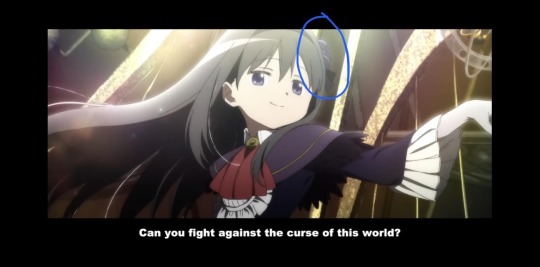
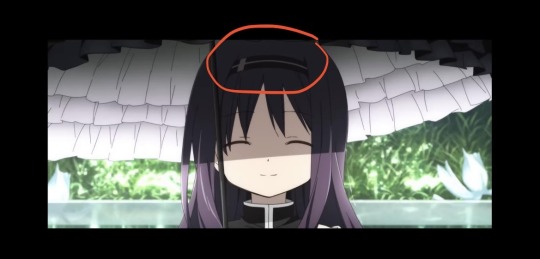
That’s right. The multiple Homuras are actually Clara Dolls.
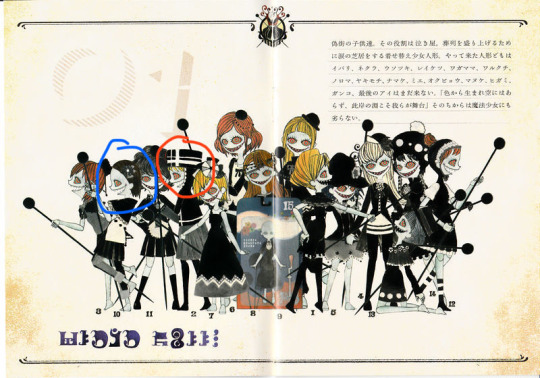
And that’s why ‘Homura’ is smiling.
Here they are! The one with the striped hat is Nekura (Gloominess or Pessimism) and the one with the flower is Mie (Vanity).
Here’s their descriptions from the art book.
[The second one to come was Gloominess. Walking out with a tapping sound, she sneered at Good-for-Nothing. “This is Good-for-Nothing! How very unbecoming.” These dolls are only disciples of Freedom, and are devoted to their lust for it.]
[The tenth to come running is Vanity. She exaggeratedly avoids Good-for-Nothing's head and says a few words. “I wouldn't be able to bear dirtying my cape with that sticky blood!” These dolls make fun of the witch's self-mutilation.]
Good-for-Nothing is Homura, by the way, but the Clara Dolls seem to consider Good-for-Nothing to be good for something after all after she splits Madoka. She turns into the Devil, and the Clara Dolls are stated to be “okay” with the Devil. If the young voices in the trailer belong to the Clara Dolls, then they also call her “Akuma-sama” now. Something like Mistress Devil, implying a sense of respect.
[… if they are not summoned, they will simmer. There are orders they will comply with, and also orders they will disobey. What they are and the witch herself's own magic are not well understood.]
At the end of Rebellion, Homura gave Madoka her ribbon back. She declared that they might become enemies in the end. Honestly, I thought that Homura would try her best to avoid Madoka entirely. The trailer suggested that Homura was meeting Madoka, though. Here’s the answer: it wasn’t Homura herself, but Gloominess, who wants freedom.
Now, I’m not sure how this situation works out. Do Clara Dolls have free will? Are they obeying Homura’s orders? Acting out Homura’s true emotions? Is Homura perhaps directly puppeteering them in order to fulfill her goals, or do they act on their own?
I find it likely that it’s a mix of both: some of them obey her, and some of them will try and fulfill her (probably very conflicting) desires, as familiars usually do. Gloominess is likely part of Homura who wants the freedom to talk to Madoka, for example, but Vanity seems to me like a Clara Doll who is obeying Homura. After all, she still needs magical girls to fight wraiths, at least until she finds a way to wipe them out.
[I'm Vanity (Mie). I'm pushing myself to the limit for someone.] And she is, of course. All of the theatrics, the calls, the organization of magical girls. These are things that Vanity is shown to engage in. All of this is for Madoka.
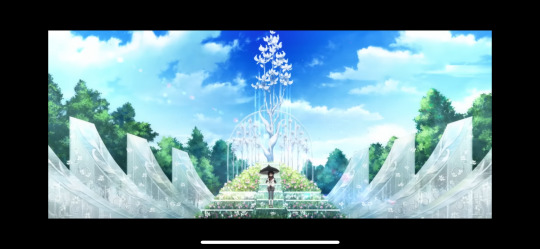
We see with Gloominess, at least, that she seems to be fulfilling a specific desire: in the background are white spider lilies. Instead of the red spider lilies that mean death, final goodbyes, and lost love, white spider lilies mean a hope for the future and a fresh start. Maybe this really is the first meeting for these two in a while, and she wants to be friends again?
Or maybe, being Gloominess, she wants to warn her about something.
[I'm Gloominess (Nekura). Forcing smiles tires me out.]
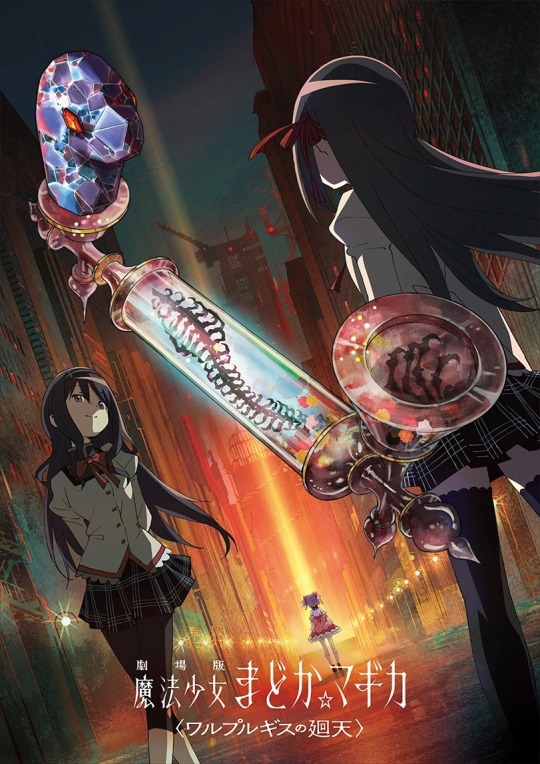
Then there’s this Homura.
Nothing about her clothes is very different. She is wearing ribbons as Homura in the wraith universe does, but look closely: the ribbons are different. They have some wavy stripes on them, while Madoka’s ribbons are plain. She does not correspond to any known Clara Doll.
However, there’s mentioned to be a fifteenth Clara Doll that is not yet born: Ai, representing love. This could be her. Is it love for others? Or love for herself? I’m hoping it’s the latter, but very likely it’s love for Madoka and her friends. This would explain why she’s trying to fight Homucifer in the poster, as Homura believes that she’s a danger to everyone else.
How can this be? Well, here’s a few options:
- The Clara Dolls are grown-up familiars. They ate souls, and they became a copy of their witch. This is a process that was explained to us in the original series, where some magical girls are stated to farm familiars by letting them eat people so that they would grow souls/grief seeds.
- The Clara Dolls are not familiars, or wraiths, but instead a secret third thing. “What they are and the witch’s own magic are not well understood”, as said in the Rebellion art book. They could be magical constructs of a different kind, but I do think that this would get into overcomplicated explanations quickly, so I favor the familiar explanation.
- The Clara Dolls could be familiars, but instead of eating souls they’re simply powerful enough to change their shape. Their strength is equal to the strength of a magical girl…. when Homura was a witch, before Homura became something more. It could also be energy from the contracts making them stronger. Maybe it’s me being sentimental, but I don’t like the idea of Homura letting anyone’s soul be nommed on.
Now, before there’s a panic about how they’ll juggle fifteen extra characters, here’s a few thoughts:
- Just because they seem different doesn’t mean they’re actually different. It might be that the Clara Dolls are a way for Homura to present herself. As Vanity, she might show off more, or have dramatic flourishes like her throne and her dress. As Gloominess, it might be that she doesn’t believe that her plans will work, so she tries to do what makes her happy. It’s likely that the Clara Dolls are just extra ways to explore Homura’s character. They’re parts of her soul, after all, and right now she is extremely powerful. She might simply want to keep her true self away from humans.
- They could work like projections. Homura wants more bodies to work with, but she has to filter herself through the Dolls’ personalities. This could result in a lot of juicy character interactions, as the things she tries to keep hidden are closer to the surface.
- Will ‘Ai/Mystery Homura’ fight against Devil Homura? Very likely! How can this be when they’re the same person? Well, who hates Homura more than Homura? That’s right. Nobody. Anyone can fight and argue with their self, it’s just usually not on the level that a reality-warper like Homura can manage.
If this is true, there’s plenty of interesting directions they can take it.
- Because the Clara Dolls have a degree of separation from Homura, they can show other characters things that Homura herself has ignored or locked away. Bad memories, affection for her friends, the resentment she must feel - everything from concern to a cry for help can be plausibly shown through them as the actors.
- Manuke (Stupidity) is specifically more naive/sincere than the others. Maybe interacting with this Doll would show the Quintet that there’s something more going on than a Devil who wants to hurt other people.
- If Ai represents a love for other people, Ai can have a strange character arc where she learns to value Homura/herself, and become self-love.
- On the other hand, Ai can represent self-love from the start, and because Homura looks very fucking unhealthy in the trailer, she only wants to stop her because she’s hurting herself. This option plays into the themes of self-sacrifice and happiness, which I believe to be some of the major themes that they’re going for.
- The poster could be misleading and Ai ends up fighting everyone but Homura. I find this the funniest option.
- Homura can hug herself. It’s possible. In fact, every character can hug Homura 15 different times.
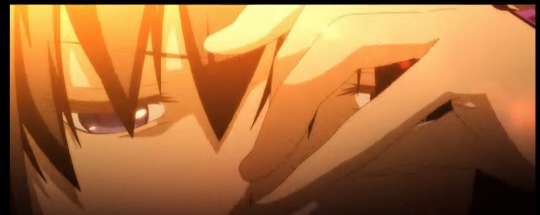
Smiles are a Clara Doll’s default expression. We have yet to see Homura smile for real.
Is this going to get very ambiguous and confusing? Probably. But rewatching for details was the fun part in Rebellion, so I’m looking forward to it!
#walpurgis no kaiten#walpurgisnacht rising#pmmm#homura akemi#madoka magica#puella magi madoka magica#Homura also looks like she’s coughing in that final shot but I can’t find a way to put it in coherently#the Homuras on the tower are too far away for me to look at. sorry.#please don’t start saying things like ‘Ai is SELFLESS LOVE who wants to free Madoka and Homura is ‘SELFISH LOVE who wants to keep Madoka’—#I… disagree. I’d be happy to debate with you but send a message please#pmmm analysis#pmmm rebellion#homucifer#clara dolls#long post
2K notes
·
View notes
Text
Alibaba's Relapse and Resurgence - A Magi Character Analysis (Part 2)

This is the second part of my Alibaba mega-analysis, in which I'll go through the second Balbadd arc, the Kou Empire arc, and the Final arc.
First Part Here.
Balbadd is Relapse

What I love about the second Balbadd arc is that it shows us how Alibaba's development isn't straightforward—because that's not how humans beings work. We take a step forward and two backwards. We believe that we learnt our lesson but, as soon as our insecurities resurface, we let them dominate our thoughts and make horrible decisions as a result—decisions that serve no purpose but to try and stroke our ego, to prove that we're valuable and that our fears are unfounded.
And decisions disguised as selfless that are actually selfish are bound to backfire.
Alibaba is a character that comes to believe more and more in himself as the story moves forward, but he's still defined by his insecurities—he still compares himself to others the moment things go slightly wrong, he takes decisions to try and be someone he's not because of his feelings of inadequacy, and he isolates himself because he overthinks and feels as if involving others in his matters will only put them in danger.
He has a great heart, and he truly cares about others, but due to how his low self-esteem he's constantly misguided in his selfless quest—he ends up taking selfish detours in order to prove to himself that he's worth something, that he's trying to do it right according to everyone's standards, when he'd be much more productive if he just believed in himself and acted upon his own beliefs and ideas.
And all of this comes to a boiling point once Alibaba's mental state is revealed to us on the boat to Balbadd. When he fought in the war in Magnostadt, compared to Kouen, he felt as if he was nothing.

Considering Kouen is the person to blame for Balbadd's subyugation to Kou, it's no wonder that Alibaba feels the need to surpass him and reclaim his country... and yet, despite his efforts, Alibaba still is too young and inexperienced—too naive, to face someone like him and believe he can truly win.
Hell, even Balbadd's state of affairs is telling him that he's not needed.
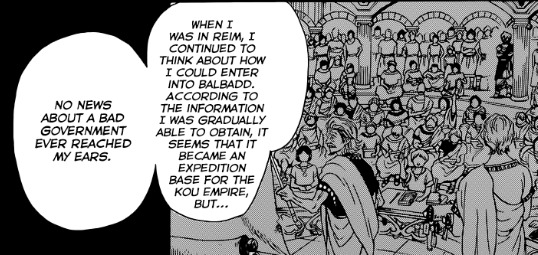
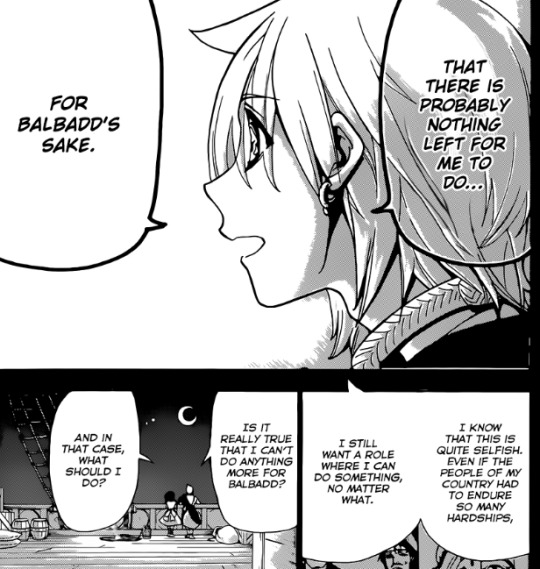
Because Alibaba's past in Balbadd represents his greatest failure, now he feels like he has to try and do something for it in some way. He wants to make up for his naivete by becoming a figure of importance to his country, and yet his "royal responsability" also contradicts the very ideas he proposed for the "democratic republic of Balbadd".
Alibaba's selfishness and selflessness come into full display here, and it's wonderful—it's human. It's incredibly ironic that in the very same chapter, Toto remarks just how much Alibaba's presence has helped so many people—the pirates, the gladiators, Morgiana, Kougyoku... and yet he just can't see it.
It's as if the manga itself is telling us that Alibaba's worries are misplaced—that instead of thinking about what he's lacking and how he's failing compared to Kouen or Sinbad, he should think about what he's good at—his honesty, his kindness, and his ability to reach out through them—and have faith in that path.

However, due to his low self-worth, instead of believing in his way of doing things, Alibaba feels compelled to play dirty, like Kouen.
Because the proud people of Balbadd, who fought so hard for the lives and happiness they wished to have, had settled into being satisfied with mild comfort and security while throwing away their dignity in the process. This grimly reminded Alibaba of his past self, so he decides to fight for his people and his country—responding to the promise he made with his father and following his duties as the royal prince of Balbadd. Thus, he faces Kouen and Koumei, now without turning down his head on the process, using all his wit and newfound confidence and showing how far he has come.
However, despite his progress, what Alibaba chooses... is to join "the dark side", a freaking colonialist empire—because if he doesn't, then he'd repeat the same mistakes as before.

To not take the perfect offer Kouen made to him—consisting of Alibaba becoming part of the forces of the Kou Empire and assisting him with his knowledge, wit and battle abilities, in exchange for the control of Balbadd—would be to be too naive, too stupidly optimistic, like he always is.
Alibaba resents his own best qualities, and so, he takes the deal, not because it's what's best for Balbadd, but rather, because it's what he has to do in order to reach his ideal self—someone like Kouen. Someone like Sinbad. He rationalizes his choice in a million different ways—it's for Balbadd, it's what I have to do to stand my ground against Kouen, it's what I have to do to be king... but when did it become about that?
Paradoxically, because Alibaba wants to become someone powerful and strong enough to make the hard choices for the sake of his country, he also goes against everything he once stood for—democracy, kindness, idealism, his promise to Morgiana...
But of course, he's unsure. Because even if it might seem like a positive development at first, with Alibaba supposedly gaining the maturity necessary to understand that he will never make a change without dirtying his hands, the truth is that such a misguided decision would have been... a mistake, as good as killing himself, symbollically.
Because by obeying Kouen, who purposefully strikes at Alibaba's insecurities in order to take him to his side, Alibaba fell back into the habit of following others and trying to copy what they do right instead of forging his own identity and finding out what are his own strong points, and it would have led him to become as twisted as Kouen and Sinbad were.

After all, once he chooses to fight Hakuryuu in order to "protect Balbadd", what he actually ends up doing is almost killing one of his trusted friends, cutting his legs off, and going against everything he had previously learnt. And it's precisely because of that... that Alibaba ends up dead.

Alibaba is punished for choosing wrong—for, despite having the best intentions, once more making the same mistakes due to his low-self worth, trying to compensate from what he perceives that he lacks.
Finding your Worth

Despite Judar claiming that Alibaba lost because he wasn't merciless enough, after going through the life-changing experience of... literally dying, Alibaba finally understands.
He didn't do it for Balbadd's sake. He did it for himself. And when he cut Hakuryuu's legs, that wasn't for Balbadd, either, he just lost himself in the violence of war.
So now, what's left? Is Judar right? Does Alibaba have to become twisted, like Sinbad and Kouen?

No. Finally, Alibaba will believe in himself. No matter what anyone else thinks, he will follow his path founded in kindness and empathy, which will be his most valuable assets moving forward!
This epiphany wasn't reach in an instant, though. In another dimension, Alibaba meets the people of Alma Torran, and he proves his determination to them.
He shows why he's "Alibaba", and manages to escape and come back to life, with 100 years of experience and newly acquired knowledge from them that, as we all know, he WILL use in a practical manner.
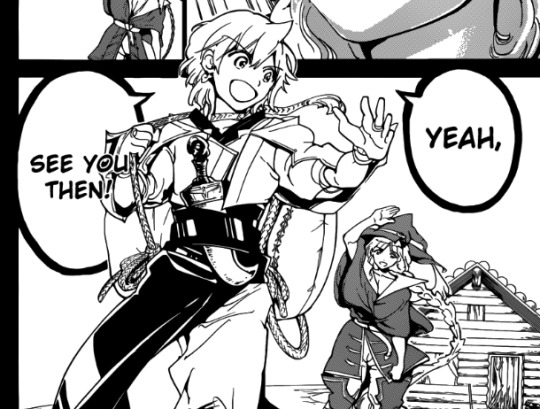
Alibaba in the final arc is the ultimate version of the coward we knew at the beggining of the series. An Alibaba that has all the key things he lacked at the beggining; strength, experience, and confidence. And thanks to that, he's able to shine like he never did before, using the skills he gained throughout his life to the best of his ability in order to face even the likes of Sinbad.

He's calm, and he knows that he doesn't need to make quick judgements just from hearsay. He explores the world Sinbad created, and without being given the answers from anyone else, HE decides what he likes and dislikes about it, a farcry from the easy to manipulate Alibaba from before. I guess that you could say that now he KNOWS who he is. He fights with confidence, he negotiates with confidence, he has faith in his ideas, takes the help of others when needed, and, through opening his heart, he gains the trust of those around him, and... just like that, the mediocre Alibaba flourishes into a marvelous person who took advantage of his best traits to shine. Ja'far puts it perfectly:

He helps Kougyoku out of the goodness of his heart, is incredibly upfront about Sinbad's twistedness (proving his honest nature once again), and ends up making the Kou Empire great again.
Alibaba thrives, and the only thing that changed is that now, he's living with pride in himself... with worth.

Balbadd is Letting Go
When Alibaba comes back to Balbadd, everything he had been worried about had been fixed WITHOUT himself, and he realizes how foolish he had been. How he was a hypocrite for trying to install a democratic republic while doing all these things for Balbadd purely due to the fact it was his responsibility as its prince with royal blood.

That's why, when offered the chance to take the reins once again, unlike someone like Sinbad, who has to control everything, he responds saying...
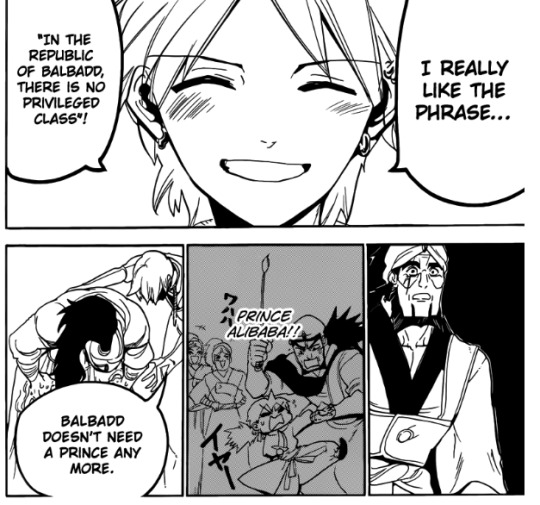
I find this scene wonderful, not just because it shows his growth in regards to finally letting his ego-stroking obssession with Balbadd go, but also because it showcases how wrong people like Sinbad and Kouen were by taking matters by their own hands and committing so many atrocities for their counties instead of believing in their people. After all, just imagine the atrocities Alibaba would have continued to commit in the name of the Kou Empire's expansion, losing himself and his moral integrity in the process all to protect a country that wasn't even his responsibility in the first place.

The idea that his previous determination was foolish is reinforced once again in his meeting with Aladdin, Morgiana and Hakuryuu. He apologizes for cutting Hakuryuu's legs and trying to kill him; for almost losing his moral integrity in order to protect something, thinking it was the only way.
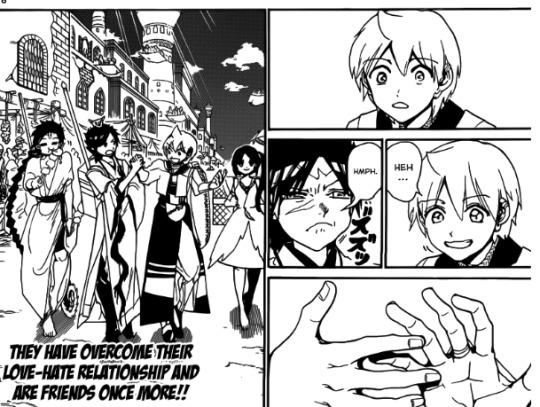
Ohtaka subverts our expectations by showing how seemingly irreparable relationships full of differences and conflict that have been built up throughout the manga can be solved easily, in basically less than a page, because sometimes the solution really is that simple—simply requiring someone to be the better person. People could argue this is rushed and disappointing, but I’d say it's the perfect way to illustrate the strength of Alibaba’s ability to understand, forgive, and apologize. The entirety of the final arc is a subversion of battle shonen, of big, climatic fights (Sinbad vs Kouen), of tales of royalty and selfishness, favoring empathy and love instead.
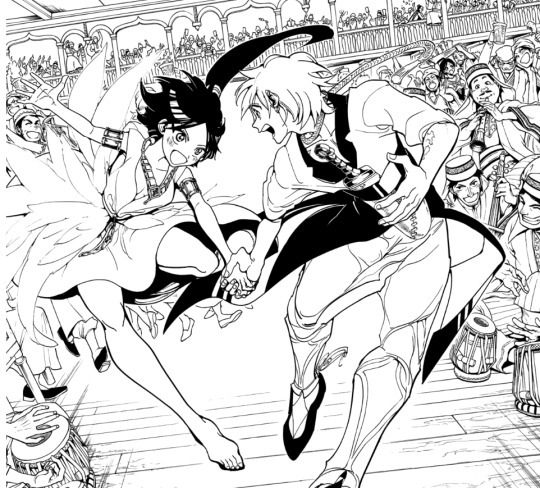
Alibaba’s simpleness and kindness is a clear foil to Sinbad's—the main antagonist of this arc, someone who thinks the ends justify the means and that would do anything for his country. His growth is also reflected with his relationship with Morgiana, going from someone who was "rejected" and had his confidence DESTROYED as a result... to a confident young man who straight out asked the girl he was in love with for MARRIAGE, and she accepted, without second thoughts on the matter. As a final test of fire, Alibaba has to go against the at-first-glance perfect Sinbad himself, and prove why no one, no matter how much they shine, can rule and enforce their ideology over everyone else.
Sinbad vs Alibaba
Once Sinbad brainwashes the entire world, even Morgiana—the person who Alibaba views as the bravest in the whole world—is saying that Sinbad is right. And Alibaba's confidence is shaken.

Even he, previously, was blinded by Sinbad's light. He followed him, his idol, blindly, thinking he could no harm, almost to the point of losing himself as his assistant as a result... something that happened to basically all of his followers, who discarded their protagonism in their lives, favoring the charisma of the High King. Maybe Sinbad was right again. Maybe... he should just obey, after all, he's just a coward, right...?
AS IF!

Alibaba shows how far he has come by going against the entire world, even those he loves or looks up to—believing that HIS way is the right path to take, because that's the answer he came up with by himself. The boy who didn't know who he was and submitted to the blinding will of others is no more... now HE makes the calls, because he believes in himself and in the lessons that came from all that he has gone through. As he puts so eloquently in his fight against Hakuryuu:

Believing in the importance of free will and multiculturalism, and in order to protect their loved ones, Aladdin, Alibaba, Hakuryuu and Judar enter the Sacred Palace... and once again, Alibaba isn't shaken by what everyone tells him is "right" or "wrong", "allowed" or "not allowed.

He comes up with an answer, and I love this moment, because the Alibaba from the past would have given the naive, easy, and not realistic answer that made Sinbad and Arba react incredulously, but now he has matured, and he can come up with something realistic and satisfactory, without compromising anything in the process.
And, by joining efforts with everyone, they end up with a solution that respects everyone's beliefs and wishes—the complete antithesis of how Sinbad was operating and a perfect encapsulation of Alibaba's character—someone who joins forces with others through emotions and creates solutions wit his brain and his heart.

It's beautiful and natural growth, and I can't praise it enough. And during the final confrontation with the entire world, he continues to deliver, going against his own master Sharrkan and winning, this time through his strength and experience.
But it doesn't end there. Faced with an infinite amount of enemies, he continues to believe, recalling the faith Aladdin and everyone else had in him.

He deserved to be King Vessel, and he'd prove it right there and then. And in a wonderful union of the thematic and physical, he fights. Through his strength, he shows his growth. His confidence, and his determination. He is what Sinbad would have been if he didn't lose himself, he's... a true king vessel, one who fights for and alongside everyone, first and foremost. And once the option of gathering all the power in the world is handed out to him at the cost of the lives of everyone he loves—even when he's told there's no other way...
He refuses, because he knows he's still just human.
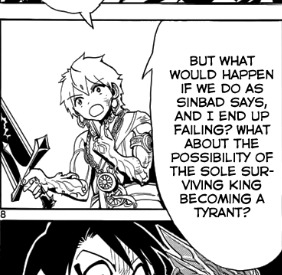
After all, through all of his development, Ohtaka reiterates the idea that no matter how incredible Alibaba is, at the end of the day, he's just a normal guy, no matter how many labels everyone tried to put on him. The wine trader of Qishan, the leader of the Fog Troupe, the prince of Balbadd, the ultimate King Vessel... He's all of those things, and yet... he shouldn't let himself be defined by those labels. Because he's so much more than that, and through his journey, he was able to understand that.

That he's great... because he's Alibaba.
It's this confidence in himself and the certainty of who he IS that allows him to reject the infinite power he is offered, knowing that he could be corrupted, just like anyone else. And it's thanks to that decision, that everyone lives, and a new world is created, full of possibilities for growth and change.
His Name is Alibaba
I think that Alibaba's development is... one of the best I have ever seen in fiction. It's so natural and satisfying, and it ends up with a character who you want to root for until the very end. Sinbad and almost every figure in his life always pushed these ideas on him... whether it is about royal duties, about sacrifices, or about power, and it's inspiring to see how he slowly comes to reject them, thanks to the confidence he builds along the series progresses. It's a reminder of the importance of knowing yourself, and of making decisions out of your own judgement, without being influenced by others' biases and limited views.
For that, you must gain experience in order to have a storage of information to compare to when you're going to make a decision, and that's precisely what Alibaba did, by going to different places and discovering different cultures and ideas. But even then, that's not enough—because you need the strength and power necessary to make a change and not be bossed around by those more powerful than you... while also never compromising your morals and integrity; with the values who define who you are, and that let you know the type of person you've become when it matters the most.

Cooperating with others allowed him to make up for his weak spots when it was necessary, and his bravery let him build the world he wanted to have for himself and for the people he loved.
All said and done, I think that Alibaba is a shining example of path to follow to improve one's self worth and of the importance of bravery—in the sense of having the courage to decide what to do for yourself. As he develops, he enhances and has more faith in his strongest qualities, realizing the way in which he's capable of influencing the world. Thanks to his friends' help and kind words, and by believing in himself as a result, he slowly went from someone who relied on others to tell him what to do and how to act, to someone who can inspire others and confront even the likes of Sinbad, all while staying humble and not letting himself get swallowed by his own ego. He's a normal person, your everyday man, and that's why he is the strongest character in Magi. He developed his good qualities as best as he could and he turned out to be respected and capable, which is proof that, given the right tools, even those who were thought to be "trash" can decide, and change the world.

You only have to keep yourself grounded instead of getting down by mistakes or tragedies, while constantly clashing views with others in order to improve and learn—and having the bravery to take a step towards your dreams, even if the road to get there might be hard and messy, and things might not turn out like you expect. If you don't take a risk, things will never change.
His first step was defying the wine trader, and from there on, once he had the courage to enter a dungeon, he achieved greatness. There can be many different ways to get there; some less righteous (as proven by Hakuryuu and Judar), but as long as you don't stagnate, doing the things that your heart tells you to do instead of bending down to others, no matter how brightly they may shine, you are moving along "the great flow" of progress, diversity and freedom.
All that was an extremely long way to say... "be yourself."
#magi#magi meta#magi: the labyrinth of magic#magi: the kingdom of magic#alibaba saluja#alibaba#alibaba meta#magi analysis#analysis#magi final arc#magikathmeta
28 notes
·
View notes
Text
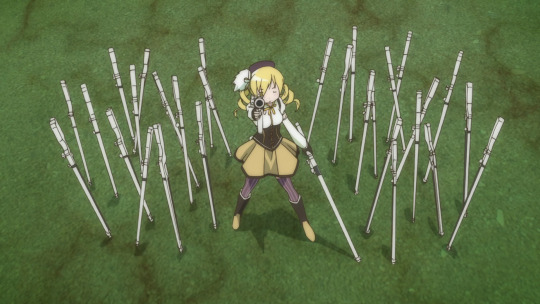

Can't remember if this is ever said explicitly, but I really vibe with the idea that Sayaka summons multiple cutlasses because Mami- who does the same unlimited weapon trick- was the first (and only) magical girl Sayaka saw in action.
2K notes
·
View notes
Text
Thinking of Homura Akemi again. Thinking of how she needs to be more powerful to save the people she loves, but no matter how much she tries, she can't be. Thinking about how she never wins the final fight. Thinking of how if Walpurgisnacht is defeated in a timeline, it needs to be Madoka defeating her; and how that means Homura can never truly stop her from getting involved. Thinking how Homura knew she could never be a God like Madoka and proclaimed herself to be the devil. Thinking of how to Homura, Madoka is selfless, and noble, and pure when Homura can never be any of those things. Thinking of how Homura sees herself as a disposable pawn to aid her queen. Thinking of how Homura's wish was for her to be brave and protect like Madoka, only for Madoka to always be more capable than her regardless of what she does. Thinking of how she seems all knowing externally, but internally she's desperate, and small and powerless. Thinking of how Homura tries to be a savior, Madoka's savior, but she's always stuck being the person being saved. Thinking of how Homura can never be anything like Madoka, even though she desperatley wants to be.
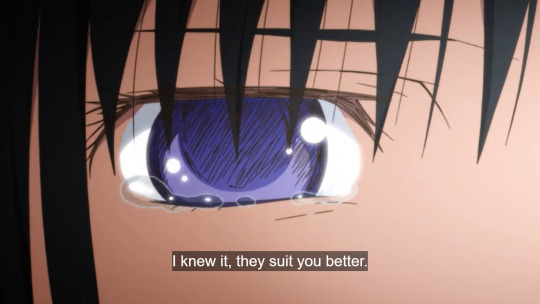
ID: A close-up of Homura's tear-filled eye in Rebellion, with the subtitle reading, "I knew it, they suit you better." The 'it' here refers to Madoka's ribbons. END ID
Thinking of Homura Akemi.
#Homura akemi#Homura pmmm#pmmm#pmmm analysis#puella magi madoka magica#madoka magica#akemi homura#rambles
468 notes
·
View notes
Text

anyone else really annoyed by how human godoka looks? She's the Law of Cycles, why is she less Eldritch than the Witches?
I hereby challenge the fandom to resolve this issue.
#puella magi madoka magica#madoka magica#kaname madoka#mahou shoujo madoka magica#my art#art#artwork#artist#digital art#artists#fanart#illustration#artists on tumblr#madoka kaname#madoka magica analysis#madoka magica fanart#pmmm madoka#madokami#ultimate madoka#godoka
105 notes
·
View notes
Text
Something rlly beautiful yet tragic abt madoka magica is that the reason madoka so powerful to begin with was just because she is madoka, and her just being herself is enough
Imo, the reason Homura unintentionally made Madoka into a god is because that’s the way she views her.
Even before all the crazy shit, when it was just a girl coming back to school after being in the hospital, Homura couldn’t fathom why someone like Madoka would even bother talking to her or trying to harbor a friendship because from her perspective, she was hopeless.
In her mind, a person like Madoka shouldn’t even exist in theory because she sees her as perfect, an angelic being whose kindness literally saved her life.
And Madoka doesn’t see herself as anything special, but through her just being kind and attentive, she was able to completely change someone’s life
The difference in perspective is so interesting and beautiful to me
The fact that madoka and Homura both see themselves as unremarkable but to the other, they’re more important than anything
#puella magi madoka magica#homura akemi#pmmm#madoka magica#madoka kaname#mahou shoujo madoka magica#madohomu#analysis#media analysis#I love pmmm
191 notes
·
View notes